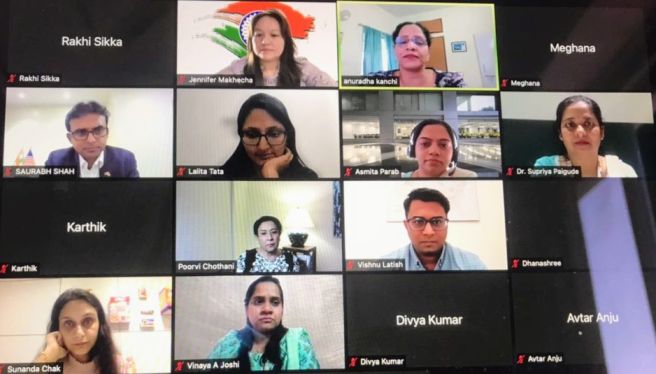Taiwanese Inc. accords utmost respect, safety to women employees at workplace
Companies in Taiwan ensure a smooth and safe working environment for married and unmarried women employees alike.
MUMBAI: Women executives and workers employed with Taiwanese companies enjoy the requisite respect, recognition, appreciation, and perks. Business corporations are much considerate of the women employee’s welfare and wellbeing in Taiwan, where President Tsai Ing-wen is a woman.
Ms. Jennifer Makhecha, Chairperson, Taiwan Chamber of Commerce, Mumbai said this while addressing a virtual session “The Problems Plaguing the Growth of Women Empowerment in India – Organisational Context” organized recently by the Indo-American Chamber of Commerce (IACC).
 “As everyone knows that Taiwan’s President is a woman. The whole Taiwanese society has been considered and recognized women’s potential at work and has given very high respect and appreciation to the women. When the Taiwanese companies come to India to set up their factories here, also very much welcome and are open to the female applicants,” she added.
“As everyone knows that Taiwan’s President is a woman. The whole Taiwanese society has been considered and recognized women’s potential at work and has given very high respect and appreciation to the women. When the Taiwanese companies come to India to set up their factories here, also very much welcome and are open to the female applicants,” she added.
According to an estimate, the number of Taiwanese companies in India is 106 and is growing strong. The majority of these companies are into production requiring a reasonably good number of the workforce including women workers, especially in the hi-precision industrial sector such as electronics.
However, the companies realize that the number of female employees is much less as compared to males, and of these women employees, the unmarried women are in majority. Companies face the high risk of losing unmarried women employees because when they come to the age of marriage, they normally leave their jobs and relocate to the place of their husbands, said Ms. Makhecha who is also an Honorary Board Member of ACN Editorial Advisory Board, an Asian Think Tank in India.

Also a board member and advisor with the Committee on the Asia Pacific Industrial Cooperation (APIC), Ms. Makhecha said, “But for Taiwanese companies, it’s difficult to face such situation as they have been investing time and money into making them educated. Hence, these companies try to relocate them to other branches which are near to the girl’s husband’s place. Companies draw a career roadmap for them to make them realize that they have to balance their career and also personal lives.”
APIC is a joint trade body floated by Taiwan Economics Ministry and top corporate groups to promote trade and business between Taiwan and Southeast Asian countries including India, Vietnam, Malaysia, Thailand, Indonesia, and the Philippines.
Living in India since 2004, Jennifer said that the companies in Taiwan have set up daycare centers at the office or factory premises for taking care of the children of the women employees. Many women entrepreneurs in Taiwan have set up after-school centers for the school-going children of the women employees/workers.
“For the married women employee, the company would try to set up a daycare center in the company premises but if the number of married women employees is less so sometimes it’s very difficult to run these centers. In Taiwan, we have after-school centers from where students are picked up from their schools for doing their homework as the tutors help them out in this. Working mothers can go to these centers after finishing their work and bring their children back home. Such women can focus on their work and as she has much less burden and more energy enhancing the overall productivity for the company. Also, it’s a good business opportunity for the women who can better run these centers in this women-helping-women initiative,” said Ms. Makhecha, who advised the Indian government to support or encourage such daycare centers in India too.
She said that Taiwan has a provision for 6-month maternity leave for pregnant women and she can come back to work when a company is required to keep her position intact.
However, in India, according to the Maternity Benefit Act, women workers are entitled to a maximum of 12 weeks (84 days) of maternity leave. Out of these 12 weeks, six weeks leave is post-natal leave. And in case of miscarriage or medical termination of pregnancy, a worker is entitled to six weeks of paid maternity leave.
“And regarding the sexual harassment and verbal sexual harassment, the Taiwanese companies form a committee comprising of the members from the companies and the ones hired from outside as a neutral person to lead this committee. This way they help to supervise, monitor, and help solve the problems related to women employees. Some companies hold seminars once in a while compulsorily for men and women to educate them to understand the importance of the female co-workers,” said Ms. Makhecha.
Other women dignitaries who participated in the virtual session “The Problems Plaguing the Growth of Women Empowerment in India included Ms. Poorvi Chotani, Law Quest International, Ms. Sunanda Chak, 4 Minute Mile Marketing Services Pvt. Ltd., Ms. Meghna Mulye, Poona Couplings Pvt. Ltd., Ms. Supriya Paigude, MIT World Peace University, Ms. Asmita Parab, BlueConch Technology, Ms. Amruta Lad, World Trade Center Mumbai, Ms. Varsha Sodha, Hyatt Hotel¸, and Ms. Vinaya Joshi, Cummings India,
Mr. Saurabh Shah, Regional President, IACC made the welcome Address while the introduction was given by Dr. Saundarya Rajesh, Founder, and President of Avatar Group.
Keynote Address was made by Dr. Saundarya Rajesh, Founder, and President of Avtar Group.
Panel Discussion, moderated by Cmdr. Anuradha Kanchi, Avtar Group.
Related article: Jennifer Makhecha (Tseng Hsiao-Li), Chairperson of Taiwan Chamber of Commerce Mumbai joins ACN Advisory Board, an Asian Think Tank



